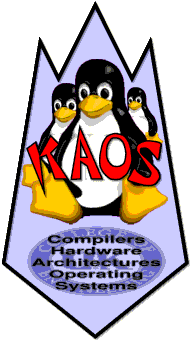
A high-performance computing system is not created by accident, but by the careful design and implementation of interactions between Compilers, Hardware Architectures, and Operating Systems. The University of Kentucky's KAOS group works to create, demonstrate, and disseminate technologies that can improve performance or provide new capabilities by integrating different aspects of computer system design. This systems research is not limited to systems hardware and software, but also includes working with application developer collaborators to port, tune, and enhance their codes. In addition to parallel computer and supercomputer system design, KAOS also conducts a lot of research involving digital imaging and computational photography, and even some working in improving making technologies like 3D printing. It was a natural evolution; building cluster video walls led to the desire to improve digital imaging and that in turn led to making custom camera parts and working to improve the technologies used in making them.
KAOS expands upon the concept of "Compiler-oriented Architecture" that Hank Dietz and his students developed from 1986 to 1999, while he was a faculty member in Electrical and Computer Engineering at Purdue University. KAOS began in September 1999 when Hank moved to the University of Kentucky to become a Professor of Electrical Engineering and the James F. Hardymon Chair in Networking. In 2002, Bill Dieter, then Assistant Professor of Electrical and Computer Engineering, joined Hank in running KAOS. He left to work for Intel some years ago. However, after many years working with the lab as a student that began with a high-school project in cluster computing, Dr. Paul Eberhart is now an Instructor and helps run the KAOS lab in his copious spare time (i.e., mostly during the Summer). The lab itself is Davis Marksbury Building room 108 and the adjacent machine room, 108A.
KAOS also is the lead organization in The Aggregate informal research consortium. Outside of the University of Kentucky, the consortium is primarily former KAOS group members continuing to collaborate from their current institutions.
What have we done? Well, most of the "New Technologies" listed for The Aggregate were initially developed by KAOS (or by its predecessor, the PAPERS group).
In case you were wondering, the name KAOS is not only a Kentucky-flavored spelling of C.H.A.O.S., but also an obscure reference to the old "Get Smart" TV series in which KAOS was the organization fighting against CONTROL. The Get Smart Wiki entry for KAOS has a lot about the fictional international organization of evil. Of course, our KAOS is neither international nor evil, but is merely "unsettling" in the sense that much of our research work involves development of disruptive technologies that can significantly advance and change how computing is done...